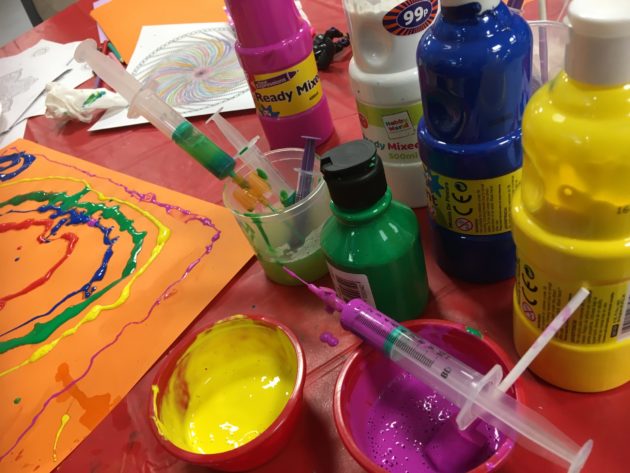A registered health play specialist uses therapeutic play to support children and young people during a hospital visit, whether inpatient or outpatient, and they can also work in hospices or in the community setting. We work with children and young people to help them cope while in hospital and to understand the ‘what and why’ of their experience.
To become a health play specialist, you must undertake a 2 year healthcare play specialism foundation degree. The degree covers areas such as the child, family and society, play and recreation, enhancing resilience, promoting health and wellbeing, policy and procedure, leadership and management, health in children and young people, and child development. The course is split between a practical placement and academic study. 200 hours each year are spent working with a mentor (who is a registered specialist and has been practising for at least 2 years).
Throughout the first year the student observes their mentor working and has to pass set competencies. In the 2nd year the student has to put into practice what they have learnt in the first year. To qualify you have to pass both the academic assignments and the practical competencies. Throughout the 2 years the student attends university 1 day a week for lectures and completes several assignments per year. Each element of the course has to be passed for you to qualify. The course is intensive and you need to be self- motivated.
I undertook my practical training at the Royal National Orthopaedic Hospital (RNOH), Stanmore, and my academic study at Nescot College in conjunction with the University of West London. The RNOH is recognised as a national centre of excellence for the treatment of acute and neuromusculoskeletal conditions in children and young people, and therefore I was very fortunate to be able to train in such a specialised setting. At the RNOH many of the patients I worked with were being treated for scoliosis, which meant working with young children through to adolescents. Some children had been attending appointments at the hospital for many years and others were dealing with the sudden diagnosis of scoliosis in their teenage years. Therefore, the treatment they received varied, from bracing changes every 6 months to spinal operations.
Each health play specialist is unique in the way they work. We all have our own specialties and working practice but we practice under a professional code of conduct set out by the National Association of Health Play Specialist (NAHPS) and Healthcare Play Specialist Education Trust (HPSET). The play specialist may work in a team with a play worker. The play worker is qualified in childcare and offers a supporting role by providing activities, assisting with planning, supporting patients, and working with the multidisciplinary team.
The play specialist’s role is varied and no 2 days are the same because each patient we meet is different and will have unique needs. The play specialist alters their approach depending on the patient’s age, developmental stage, needs, family structure, culture, and treatment. They will take their time to get to know the patient and build up trust, so that throughout the patient’s stay they have someone to lean on.
When a child is faced with a diagnosis of scoliosis there is a great deal of information to digest, which can be both emotionally and physically challenging. So how can the play specialist help? Play is essential to normalise the daunting experience of illness for children of all ages. It comes in many forms, and we as the play specialist will adapt our approach to the individual’s needs. I find that once I begin talking to adolescent patients they are keen to have information explained to them and often open up about their worries. It is important that we don’t assume as children turn into teenagers that they don’t need our support.
The play specialist can use therapeutic play to prepare the child for surgery, bracing, MRI scanning, or other procedures they may have during their stay in hospital. Real medical equipment, books, videos, adapted dolls, and role play can be used during these preparation sessions. What? Why? Children in Hospital (2019) have produced a range of videos for children of all ages to help them prepare for their hospital stay. I regularly use them and they are very well received.
Preparation gives the child time to work through anxieties or worries and learn coping strategies. It gives them a safe space to express how they are feeling. Simple devices such as a breathing star can be very helpful (coping skills for kids. com 2017). Play preparation helps children understand their illness and treatment, it enables clarity and dispels misconceptions and untruths. Play enables an expression of feelings and increases the ability to cope. Through preparation children and young people can attain a better understanding of those involved in their care, can build up trusting relationships, and can speed their recovery. During preparation children and young people can voice their worries. The play specialist can explain in age appropriate language what is going to happen stage by stage. Preparation also enables parents to ask practical questions, such as where do I wait? Can I stay with them until they go to sleep? Will I be there when they wake?
Work has been published about the needs of children to gather information when undergoing a clinical procedure. Children want to know if it’s going to hurt. In our role we always tell the children the truth. We need children to trust us, so when having a blood test or a cannula we will tell the child it will hurt but not for long. Children like to build up a picture in their head of how the situation will unfold. Who will be there in the room? Where will I sit? Will I be scared? Can my mum/dad be with me? What can I do to make it easier? By having this information, they build up strategies to help them cope and they know what to expect during the procedure.
We work with the multidisciplinary team, so we can share concerns with the team and ensure they are aware of a patient’s specific needs. We also share ideas to make the whole experience less stressful and making the children and young people more in control of what is happening.
During pre-assessment appointments patients can sometimes visit the ward. The play specialist will usually show them around, which is a valuable opportunity to build a picture of the environment they will be staying in and who will be involved in their care. When the patient meets the play specialist for the first time, they will get to know them and explain how they can assist during the stay.
Distraction is a further example of the paly specialist’s therapeutic role. This role can be in the form of play, singing, books, games, or whatever suits the individual in question. One of the most popular distractions with adolescents is their phone and I always get a smile out of them when I tell them they can ‘snapchat’ their journey to theatre. During recovery the play specialist will be able to give support and offer distractions from boredom and discomfort. You may be surprised by the amount of activities you can achieve from a hospital bed, painting, cooking, slime, card games, and many more. As part of the recovery from a spinal operation, time spent sitting in a chair is increased steadily, which can be challenging because it’s not comfortable. The play specialist can help to make the time go quicker by engaging in an activity with the patient.
Post-procedural play allows the patient to talk through their experience. What went well and what was challenging. Younger children enjoy playing with medical equipment and a soft toy, enabling them to re-enact what they have been through. They will often talk about how they felt and what scared them. By playing through these scary experiences they can come to terms with why it happened. Older patients can be angry or frustrated about why this has happened to them or anxious about school work or their social lives. We can support them by listening and sharing their concerns with the relevant people. We can direct them to support services such as the Scoliosis Association UK, which has a network of others with scoliosis, telling stories of their journey. While training we encourage many patients to join us in the playroom where they could meet others going through similar journeys. For the younger children who having a brace fitted for the first time or having one replaced we will plaster their toy so that it looks like them, which helps them relate to what’s happening to them and enables them to play through their experience.
A day in the life of a health play specialist begins with a handover, which allows us to see who is on the ward, who is having surgery that day, and how patients have been overnight. The play specialist will then aim to see all the patients who are on the morning list for surgery. They will begin by finding out how the patient is feeling and how much information they know. They can then break down the procedure stage by stage, ensuring the patient understands and has them time to ask questions. They will discuss who will be looking after them, and what to expect on their return to the ward and the following days. If the patient is anxious about a particular stage the play specialist will go through the stage with them and offer coping mechanism to help them through; they can even accompany them to theatre if needed. Throughout the day the play specialist will be supporting children and their families through normalising play, and they will support patients with play preparation, distraction, and post procedural play. They will be involved with playing games, making slime, cooking, reading, crafts, the list goes on! They may also have administrative jobs such as emails to answer, events to organise, attending safeguarding, and multidisciplinary team meetings, training sessions, creating wall displays, ensuring toys are fit for use and cleaned regularly, auditing their work, and updating play plans for long-term patients.
As a newly qualified play specialist in my first role, I love my job. It is incredibly rewarding, especially having the opportunity to help children and young people every day to cope with challenging and scary experiences. I try to bring fun and laughter to the ward, and aim to reduce anxiety for the whole family. I support the doctors, nurses, and other health professionals, with the aim of making the ward a happy, welcoming place. Children attending hospital often have no idea what is going to happen or why. The environment is unfamiliar and clinical and there are lots of strangers asking questions and looking at the patient’s body, which can be a stressful and anxious time for parents too in that they may have had long journeys, had to organise time off work and childcare, and be worried about their child’s health. Having a play specialist on the ward helps everyone to feel more secure. We aim to be relaxed and friendly, offering familiar activities and reducing anxieties.
By Gail Manning, Registered Health Play Specialist Northwick Park Hospital

